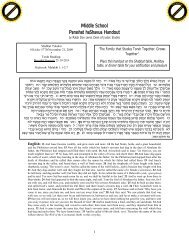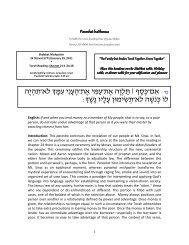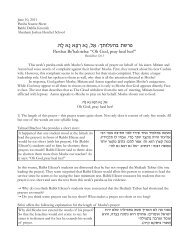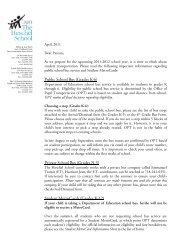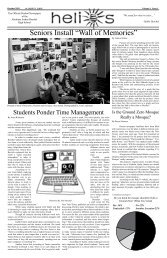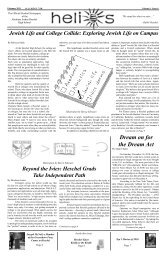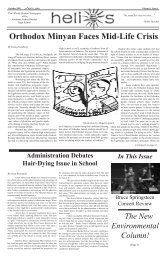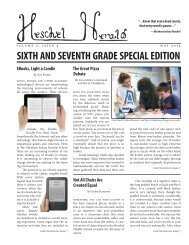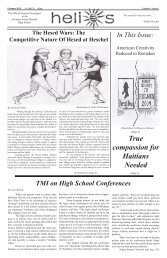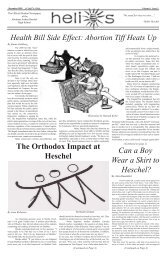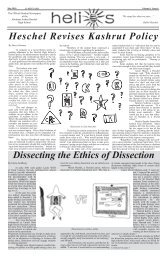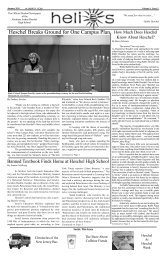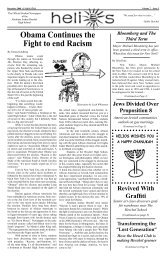Volume 1, Issue 5 (June 2011) - The Heschel School
Volume 1, Issue 5 (June 2011) - The Heschel School
Volume 1, Issue 5 (June 2011) - The Heschel School
Create successful ePaper yourself
Turn your PDF publications into a flip-book with our unique Google optimized e-Paper software.
Masada<br />
By Coby Goldberg<br />
On the recent eighth grade class trip<br />
to Israel, one of the many places visited<br />
was Masada. Masada is a mountain overlooking<br />
the Dead Sea which King Herod<br />
built into a fortress as a place of refuge<br />
for himself in case of a revolt. During<br />
the First Roman-Jewish War, a group<br />
of Jews led by Eliezer Ben-Yair used the<br />
mountain fortress as a base for harassing<br />
Romans. <strong>The</strong> Romans then laid siege<br />
to Masada and after three months were<br />
finally prepared to breach the fortress<br />
and take the mountain. However, upon<br />
reaching the top of the mountain the<br />
Romans found that all of the inhabitants<br />
had committed mass suicide.<br />
After waking up at four in the morning<br />
and hiking to the top of the mountain<br />
in time to watch the sunrise, the<br />
eighth grade went to an overlook. At the<br />
overlook, when you shouted, there was a<br />
loud echo a few seconds later that sounded<br />
like many voices. At this point our<br />
tour guide had us shout the phrase that<br />
graduates of basic training in the army<br />
say as a sort of allegiance while atop Masada,<br />
“Masada lo tipol shenit”, “Masada<br />
will not fall again.”<br />
At this point I realized what Masada<br />
represented and why it is such an<br />
important place. Masada represents the<br />
beginning of the two thousand years of<br />
exile. It was the last place of Jewish resistance<br />
for two thousand years. <strong>The</strong> falling<br />
of Masada would represent the downfall<br />
of the Jewish state of Israel, a second<br />
exile, which is why Masada cannot fall<br />
again. ◆<br />
Eighth Grade in Israel<br />
An Israeli Energy Dilemma<br />
By Ben Sternklar-Davis<br />
Israel’s lack of domestic natural<br />
resources such as oil and gas has been<br />
acknowledged for many years. David<br />
Ben Gurion foresaw the future when he<br />
set a personal example by choosing to<br />
settle in Kibbutz Sde Boker at the centre<br />
of the Negev, and established the National<br />
Water Carrier to bring water to<br />
the area. He saw the struggle to make the<br />
desert bloom as an area where the Jewish<br />
people could make a major contribution<br />
to humanity as a whole. From Israel’s beginning,<br />
the need for energy resources<br />
has meant that Israel has had to invest in<br />
greener, more efficient energy technology<br />
such as solar power and wind farms.<br />
Yet the recent discovery of huge reserves<br />
of natural gas off the country’s northern<br />
coast threatens the country’s adoption of<br />
greener energy.<br />
Israel uses its energy very resourcefully.<br />
It has almost constant sunlight<br />
and therefore it is capable of generating<br />
a great amount of electricity due to the<br />
hundreds of solar fields. Additionally,<br />
Israel has many hilltop wind turbines,<br />
Politics and the Israel Trip<br />
By Ronen Schatsky<br />
During a two-week-long experience<br />
in Israel, eighth graders had numerous<br />
opportunities to develop their opinions<br />
and feelings about Israeli politics. To<br />
determine whether this happened, this<br />
reporter briefly asked a representative<br />
sample of eighth graders whether the<br />
trip affected their views about Israeli<br />
politics; approximately one quarter of<br />
this sample answered in the affirmative.<br />
One of them, Sarah Joyce, states<br />
that she “used to think of Israel as just<br />
another country,” but now she feels it is<br />
“her home.” This has caused her to, “take<br />
a stronger stand in its politics.” It is clear<br />
that Sarah’s intimate experiences, with<br />
the land and its people, impacted her political<br />
interests. Apparently, the trip was<br />
somewhat successful in connecting students’<br />
interest in Israeli politics. <strong>The</strong> assertions<br />
of other eighth graders, support<br />
which generate much wind electricity. It<br />
also has many water turbines.<br />
In 2009, about 120 trillion cubic<br />
feet of gas reserves were discovered in<br />
the Mediterranean, much of it within<br />
Israeli territory. Some months later, another<br />
field, sized at 8.7 trillion cubic feet,<br />
was found, and then a second, twice the<br />
size. <strong>The</strong>se gas fields are so big that Israel<br />
could easily become an exporter of nonrenewable<br />
energy.<br />
Now some Israelis are concerned<br />
that the use of nonrenewable energy will<br />
force the renewable energy plants to shut<br />
down. On the other hand, if Israel can<br />
replace its coal-based electricity with gas,<br />
this might mean that the air will become<br />
cleaner and new technology such as gaspowered<br />
public transport and electric<br />
cars will develop.<br />
<strong>The</strong> discovery of such huge gas reserves<br />
could make a big difference to<br />
Israel’s economy. Many hold the hope<br />
that it will not affect the development of<br />
renewable energy, and will not mean a<br />
complete return to a wasteful and environmentally<br />
destructive time, especially<br />
since Israel currently has the greenest<br />
energy policies in the region. ◆<br />
this. Lena Diamond, for example, describes<br />
greater awareness of the goingson<br />
of the State after the trip. Moreover,<br />
Dassi Kalmanofsky says that her preexisting<br />
opinions about Israel “became<br />
stronger,” mainly because of “the argument<br />
on the bus.”<br />
Dassi’s remarks highlight another<br />
aspect of the trip: the conversations<br />
among students, who seemed to become<br />
closer as the trip wore on. <strong>The</strong> said “argument,”<br />
really more a shouting match<br />
of opposing views than a disciplined<br />
expression of opinions, exemplifies a<br />
social situation that further developed<br />
students’ opinions about Israel. As often<br />
happens when students have strong<br />
feelings, few opinions could be fully<br />
expressed without interruptions from<br />
those with opposing viewpoints. So, it<br />
was not clear how much was learned<br />
from the perspectives of others, but, at<br />
Continued on page 10<br />
<strong>The</strong> Joseph Slifka Middle <strong>School</strong> <strong>June</strong> <strong>2011</strong> ◆ 5



